MATHEMATICS MAJORS AND MINORS
To become a mathematics major one must have an interest in and talent for mathematics. There are no special departmental admission requirements. To declare a math major (or minor) contact our Undergraduate Advisors.
DEGREE OPTIONS
BIOINFORMATICS MAJOR
Translating Data into Scientific Breakthroughs
Bioinformatics sits at the vital intersection between mathematics, life sciences, and data science. This cutting-edge field applies intensive computational methods to analyze and understand complex biological information related to health, biotechnology, genomics, and more.
The University of Utah's new bioinformatics bachelor's degree provides rigorous interdisciplinary training to thrive in this rapidly growing area. Through a comprehensive curriculum, you'll gain expertise in areas like biostatistical modeling, machine learning for genetics, biological data mining, computer programming and computational techniques for biomedical research.
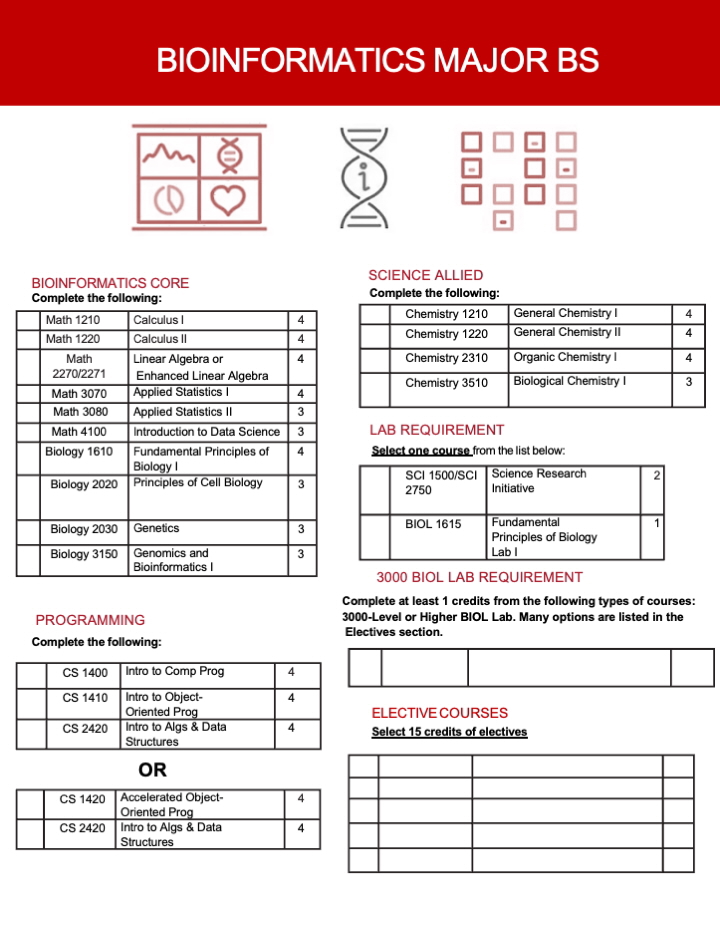
MATHEMATICS MAJOR
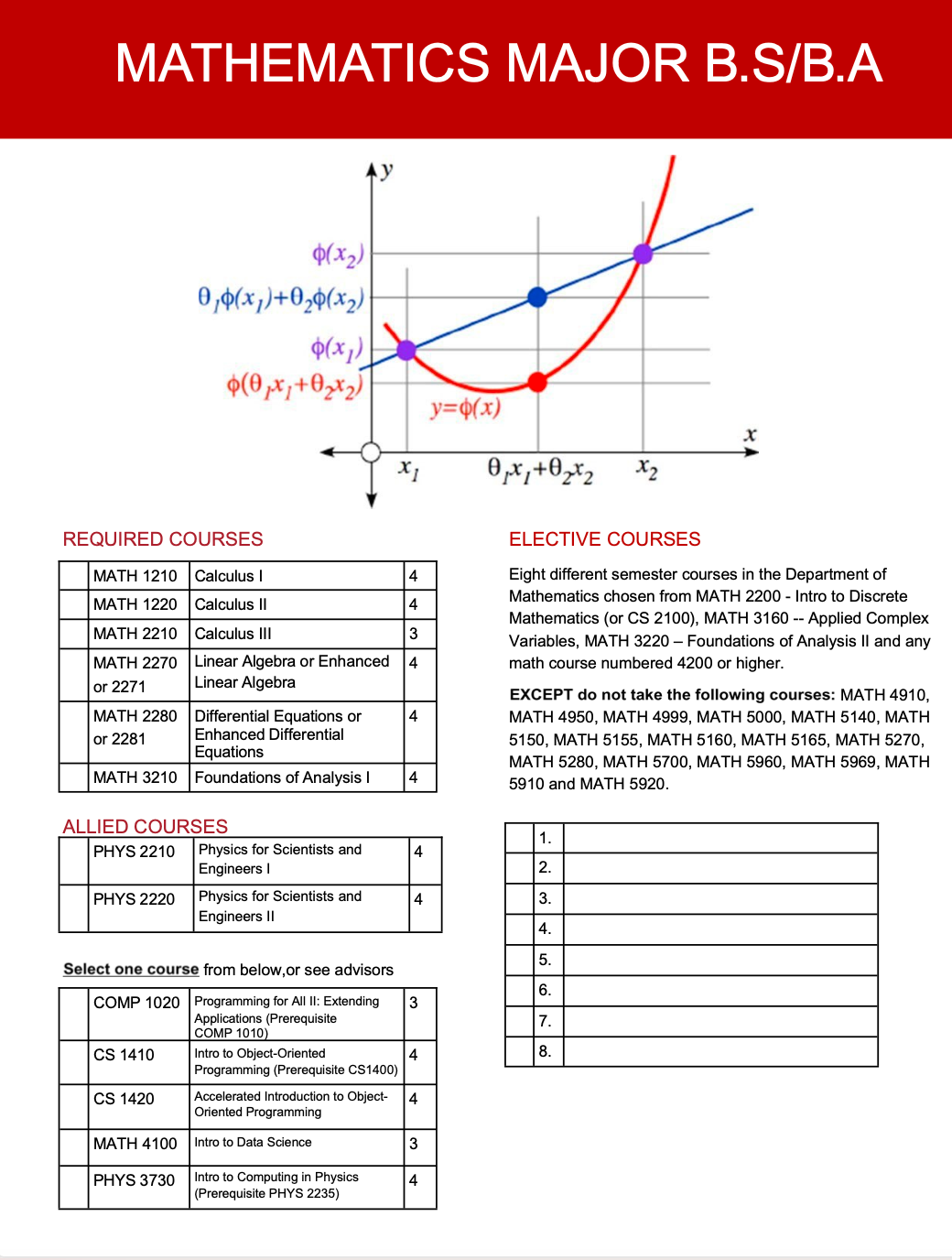
MATHEMATICS MAJOR WITH STATISTICS EMPHASIS

APPLIED MATHEMATICS MAJOR
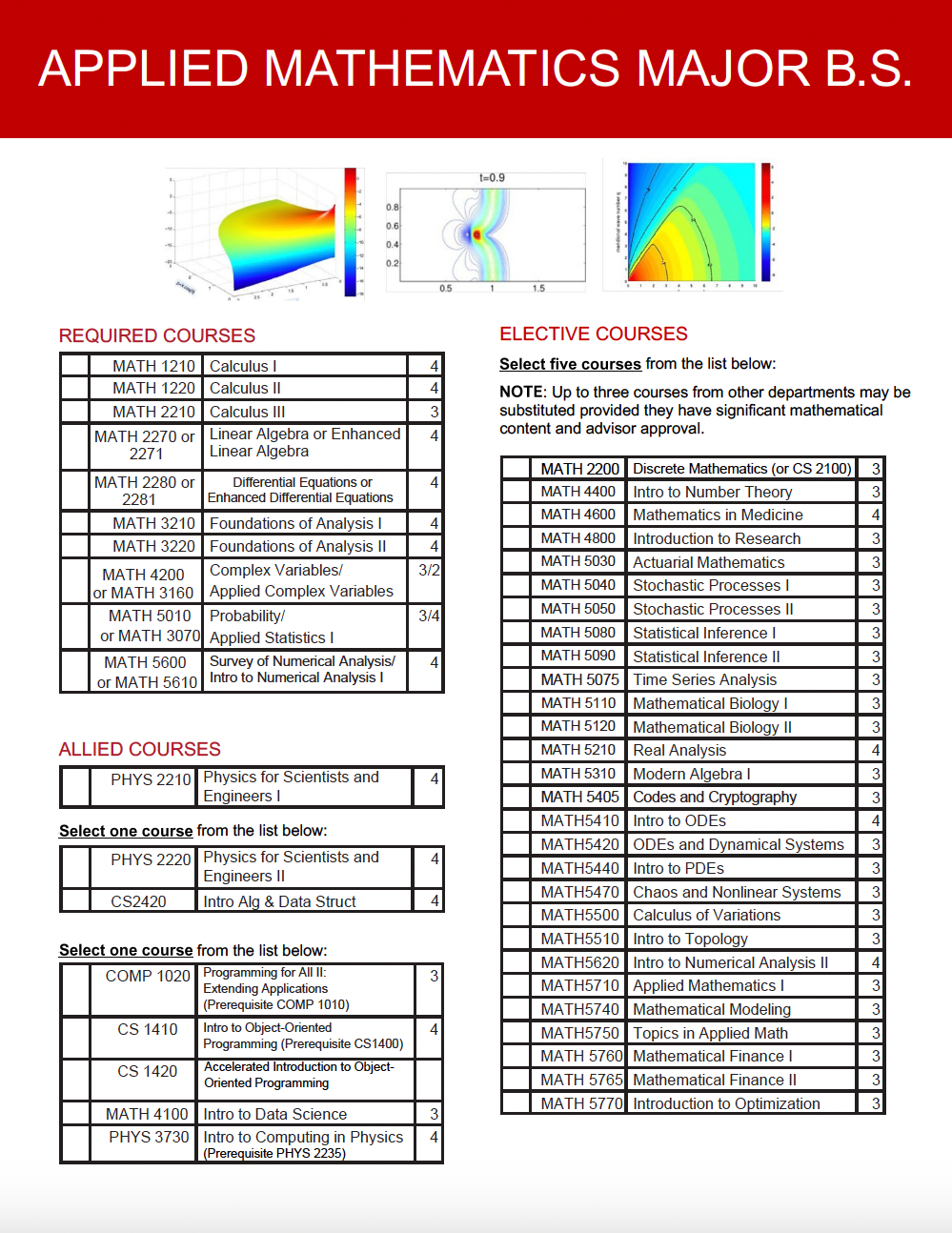
MATHEMATICS TEACHING MAJOR
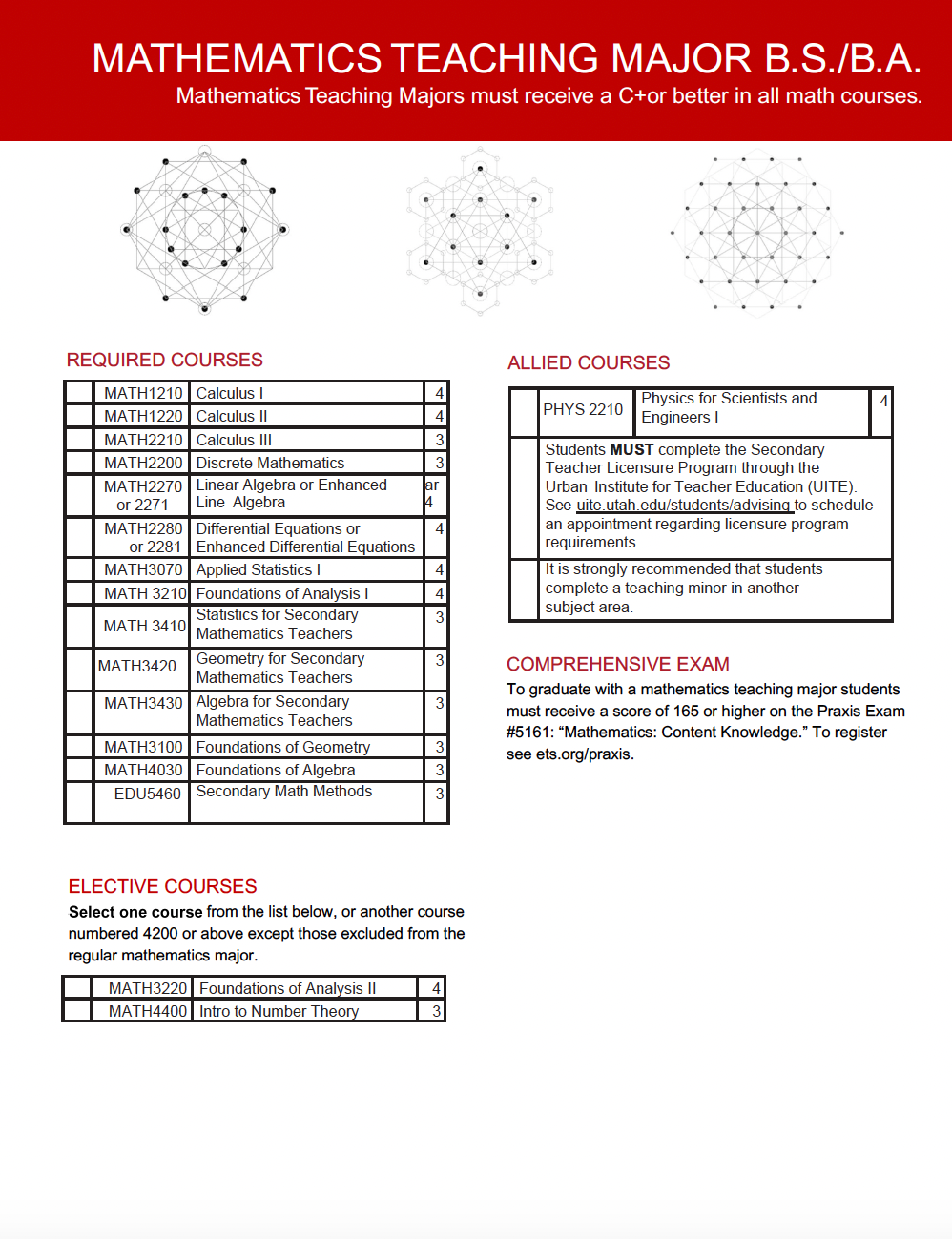
HONORS DEGREE IN MATHEMATICS
In order to pursue an Honors Degree in Mathematics, students must first be admitted to the Honors College. Students must complete the coursework required by the Honors College as well as the mathematics coursework. For more information please see the Department of Mathematics Undergraduate Advisors.
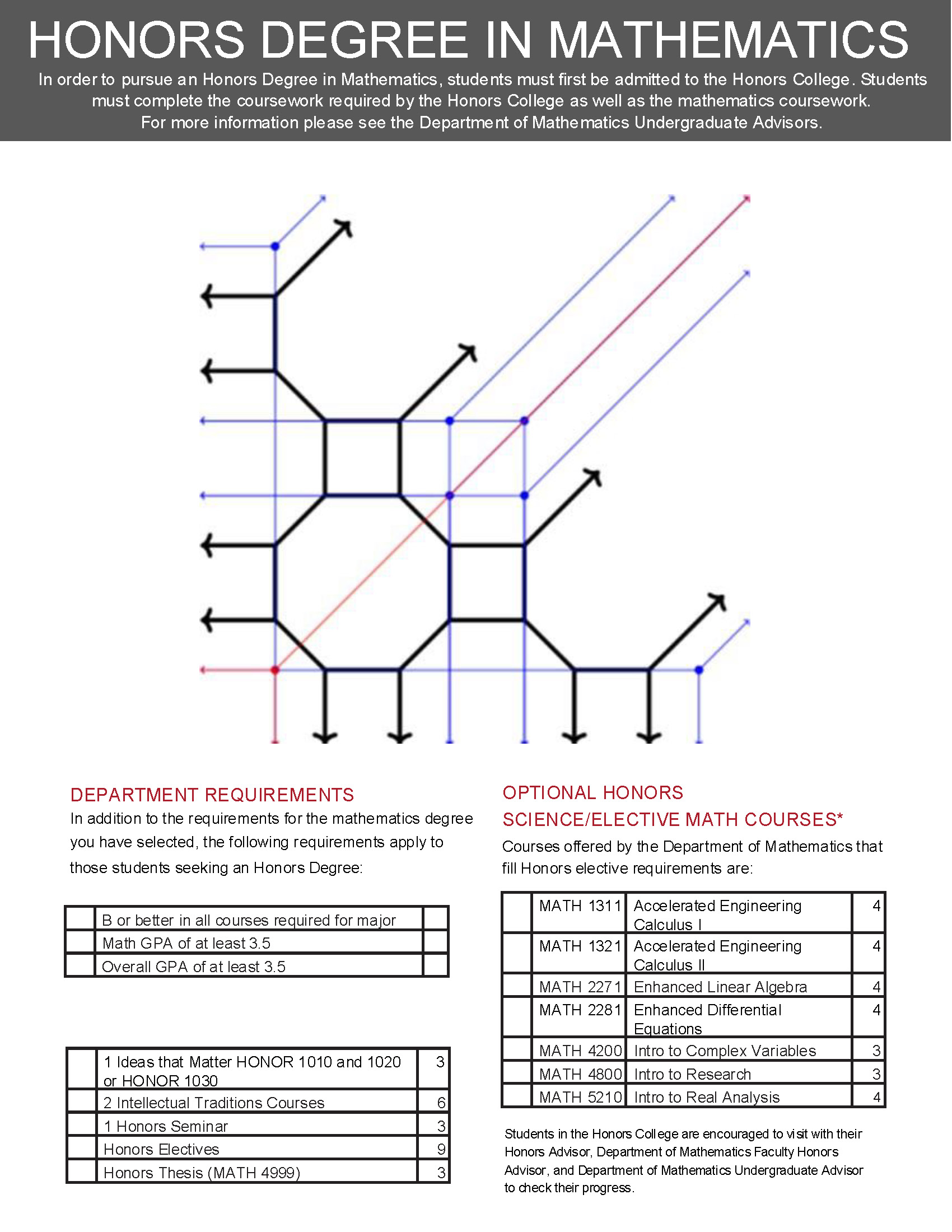
Students in the Honors College are encouraged to visit with their Honors Advisor, Department of Mathematics Faculty Honors Advisor, and Department of Mathematics Undergraduate Advisor to check their progress.
MATHEMATICS MINOR & MATHEMATICS TEACHING MINOR
Mathematics minors must receive a "C" or better in all math courses.
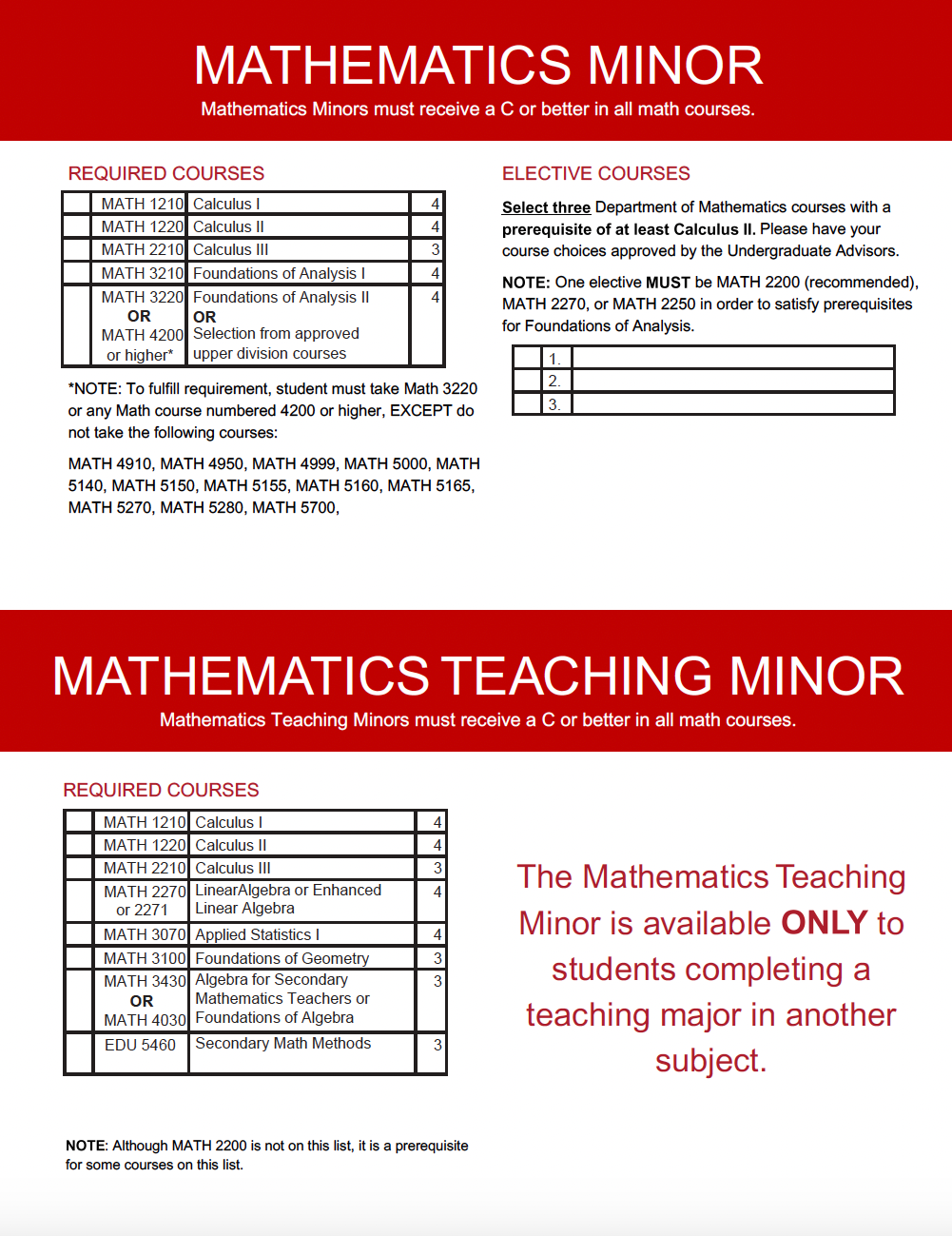
COMBINED BS/MS PROGRAM
Undergraduate math majors who would like to be admitted to the combined BS/MS program
must apply during their junior year. To be eligible for the program a student must
have maintained a 3.5 GPA overall and in their major (which must be mathematics),
and indications must be that the student will successfully satisfy the requirements
for both the Bachelor's and Master's degrees within two years after beginning the
program. Interested students must apply to the department's graduate program and submit
a detailed program of study that has been prepared with the help of the student's
advisor(s). Students must also submit a graduate application to the admissions office.
When applying for the BS/MS program students must meet the regular graduate application
deadlines:
March 15th for Fall Semester
November 1st for Spring Semester
March 15th for Summer Semester
Please note that beginning the program in the summer semester is not encouraged due
to the lack of graduate program classes available in the summer.
Students wishing to participate in this program are strongly encouraged to participate in research early in their program of study. Transfer students may be considered for the program
only after completing 24 hours of coursework at the University of Utah.
The main advantage of the combined BS/MS program is that it can help students who take more than the 122 credits required for the undergraduate degree. By applying to the combined BS/MS program the extra credits may be fully counted toward to the Masters degree.
Here is an example. Suppose that, as an undergraduate, a student takes 135 credits, then graduates and wants to join the Masters of Mathematics program. The university will allow for only 6 of the extra 13 credits to be applied towards the Masters degree. The student is now required to take 24 further credits to obtain the Masters. If, instead, the student had applied to the combined BS/MS program before graduation, then the 13 extra credits could all be applied toward the Masters (assuming the credits satisfy the requirements of the Masters of Mathematics program). For this to work the student must be admitted to the combined BS/MS program before completing their undergraduate degree.
Based on these considerations, the combined BS/MS is most useful when an undergraduate math major:
- Already plans to obtain 152 credits of coursework, 30 of which satisfy the requirements of the Masters in Mathematics programs, and
- Intends the Masters degree to be a terminal degree in mathematics, i.e. the student does not intend to apply to PhD programs in mathematics.
The latter point relates to a potential downside of the combined BS/MS program. The main downsides to be aware of are:
- If you are an international student your visa status could potentially change. Before applying to the combined BS/MS program you should consult the Office of International Student & Scholar Services to determine if there could be complications with your visa status.
- In some cases, scholarships that apply towards your undergraduate degree may no longer apply once you enroll in the combined BS/MS program. If this happens you would be responsible for tuition. Contact the Office of Scholarships and Financial Aid to determine if this may apply to your situation.
- If you intend to apply to Mathematics PhD programs after graduation, your application may be negatively impacted by holding a Masters degree. Some universities offer a smaller amount of tuition waiver to applicants that have Masters degrees. And typically, having a Masters degree does not increase your chances of being admitted to a PhD program, as admissions committees usually give more weight to the coursework on transcripts rather than degrees held.
For more information please contact our Directors of Graduate Studies, Elena Cherkaev elena@math.utah.edu or Srikanth Iyengar iyengar@math.utah.edu
CLICK HERE TO SCHEDULE AN APPOINTMENT WITH AN ACADEMIC ADVISOR
DEPARTMENTAL GRADUATION REQUIREMENTS
In addition to the required coursework outlined in this publication, all math majors are required to:
- Receive a C or better in all math courses (this applies to the minor as well) and a C- or better in allied courses. Mathematics Teaching Majors must receive a C+ or better in all math courses and a C or better in physics.
- Maintain a minimum GPA of 2.3 in mathematics courses. Mathematics Teaching Majors must maintain a minimum GPA of 2.8 in mathematics courses.
- Complete at least 18 upper division credit hours of University of Utah mathematics courses.
- Successfully pass, with a C or better (C+ or better for Mathematics Teaching Majors) in all mathematics courses within 3 attempts. Failure to pass any mathematics course with a C or better within 3 attempts will result in dismissal from the major. A withdrawal will be considered an attempt.
- An exit survey is required the semester a student graduates.
NOTE: Students who have taken courses in the engineering math sequence should see an Undergraduate Advisor to review how those courses will fill requirements in the major.
REQUIREMENT CHANGES
Students are generally held to the Department of Mathematics graduation requirements in place at the time they declare their major. Students who interrupt their studies may be held to the graduation requirements in place when they re-enter the University. Graduation requirements shown on this sheet are deemed to be reliable, however, it is the student’s responsibility to check with the advisor periodically concerning possible changes or corrections.
MATHEMATICS
MAJORS AND MINORS PACKET ARCHIVE
The following links below are PDF versions of our Mathematics Majors and Minors Packets. If you have not declared your major or minor, please refer to the most recent released packet. If you are unsure what catalog year you declared in, please contact advisor@math.utah.edu.

